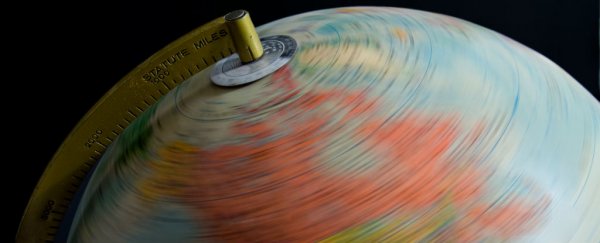It should not come as a surprise to you that our planet, with its atmosphere and everything on it, is constantly spinning. At the equator the speed of rotation is about 1,675 kilometres per hour (1,040 mph), which means that right this very moment, you're travelling at something like 465 metres per second, or a little less if you're located closer to one of the poles.
So why can't we all feel it? The answer lies in the nature of Earth's movement. Think of being on an aeroplane when it's smoothly travelling at a constant speed and constant altitude. You've unbuckled your seatbelt to go on a walk down the aisle, but you can't feel the movement of the plane. The reason is simple: you, the plane, and everything else inside it is travelling at the same speed. In order to perceive the movement of the plane, you have to glance at the clouds outside.
It's the same with Earth's rotation - our planet completes a full turn around its axis every 23 hours and 56 minutes, spinning incessantly at an almost entirely constant rate. One way to feel motion is to feel wind on your face - but remember that Earth's atmosphere is travelling with us at the same speed.
If Earth were to change acceleration, we'd certainly feel that, and it wouldn't be pleasant, like a sudden slam on the brakes at a planetary scale (while the atmosphere would keep moving at the same 465 metres per second and wipe the surface of the planet). But just like we can't feel the constant movement of a plane, the spin of our gigantic space ride is normally imperceptible, too.
So why does Earth spin so constantly? Because there's nothing stopping it. When our Solar System formed out of a collapsing dust cloud and spun out into a flattened accretion disk with a bulge in the middle, all the planets inherited that rotation. The Sun, all our neighbouring planets, their moons, and everything else scattered in our system is still spinning after billions of years because of inertia.
To interfere with that, an external unbalanced force would have to be applied - in simple terms, the whole shindig would have to collide with some other object, and throw the rotation into disarray.
Now, as I mentioned earlier, the spin of our planet is happening at an almost constant rate. If we're being precise, Earth is slowing down ever so slightly thanks to the Moon being a bit of a gravitational drag. It pulls on the tidal bulge of our planet, which causes tidal friction, putting energy into the Moon's orbit.
As a result, sometimes we need to add an extra second to our clocks, because Earth's rotation is slowing down by two-thousandths of a second every day. However, because this change in speed is so infinitesimally small, for our purposes, it still feels like Earth is rotating at a constant rate. In other words, it feels like nothing at all.
